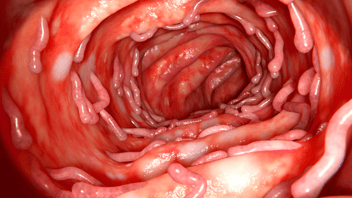3 Things to Remember About Inflammatory Bowel Disease (IBS) For The NCLEX Exam

3 Things to Remember About Inflammatory Bowel Disease (IBS)
Diverse Conditions: IBD encompasses various chronic inflammatory disorders of the digestive tract, primarily Crohn's disease and ulcerative colitis. These conditions involve the immune system mistakenly attacking the gastrointestinal tract, leading to inflammation, ulceration, and potential complications.
Symptom Variability: Symptoms of IBD can vary widely among individuals and may include abdominal pain, diarrhea, rectal bleeding, weight loss, and fatigue. Flare-ups and periods of remission characterize the disease, making management and treatment challenging.
Lifelong Management: IBD is a lifelong condition with no definitive cure, but it can be managed effectively. Treatment focuses on reducing inflammation, controlling symptoms, and preventing complications. Medications, dietary changes, stress management, and, in severe cases, surgery are key components of a comprehensive management plan. Regular medical monitoring and communication with healthcare providers are essential for maintaining quality of life and minimizing potential long-term impacts.
.png?width=1200&height=630&name=nclex%20review%20for%20angina%20(2).png)
Some key points to know about Inflammatory bowel Disease (IBS) is that it includes two main types: Crohn’s disease and ulcerative colitis. IBS is characterized by chronic inflammation of the gastrointestinal tract, leading to a variety of symptoms such as abdominal pain, diarrhea, weight loss, fatigue, and malnutrition. Lastly, effective management requires a collaborative approach involving many healthcare workers to improve the quality of life for these patients and preventing further complications.
Overview for Inflammatory Bowel Disease (IBS)
Autoimmune inflammatory conditions affecting the GI tract, periods of remission and exacerbations occur
General Information on Inflammatory Bowel Disease (IBS)
1. Ulcerative Colitis
a. Affects colon and rectum
b. Poor absorption of nutrients
c. Edema + Lesions + Ulcers
d. 10-20 Stools/day→ Blood & mucus
e. Avoid foods that may exacerbate symptoms
i. Raw vegetables and fruits, nuts, popcorn, whole-grains, cereals, and spicy foods
2. Crohn’s
a. Affects entire GI tract
b. May affect other body systems (especially skin and lymphatic system)
c. Thickening + scarring + abscesses
d. 5-6 Stools/day→ Pus & mucus
.png?width=1200&height=630&name=nclex%20review%20for%20angina%20(2).png)
Therapeutic Management for Inflammatory Bowel Disease (IBS)
1. Major medication classes
a. Corticosteroids→ ie. Methylprednisolone
i. Decreases inflammation
ii. The risk for Cushing’s Syndrome with chronic use
b. Salicylates→ i.e. Sulfasalazine
i. Inhibits pro-inflammatory chemicals (prostaglandins, interleukin-I, Tumor Necrosis Factor)
c. Immunomodulators→ i.e. Azathioprine or Methotrexate
i. Decreases immune and inflammatory response
ii. Helps decrease the need for corticosteroids
d. Antidiarrheals→ i.e. Loperamide
i. Decrease loss of fluid and electrolytes
2. Surgical options
a. Bowel resection or Colectomy
i. Ulcerative Colitis – curative
ii. Crohn’s – palliative
b. Surgical removal of abscesses
Nursing Case Study for Inflammatory Bowel Disease (IBS)
Patient Profile:
Name: Ms. Roberta Rodriguez
Age: 32 years old
Gender: Female
Medical History: Family history of Crohn’s disease

Presenting Symptoms:
- Chronic abdominal pain and cramping
- Frequent diarrhea with occasional blood in stool
- Fatigue and unintended weight loss
Medical Examination and Diagnostics:
- Physical Examination: Ms. Rodriguez displayed tenderness in the lower abdomen with increased bowel sounds.
- Laboratory Tests: Elevated C-reactive protein and erythrocyte sedimentation rate, indicating inflammation
- Colonoscopy and Biopsy: Revealed signs of inflammation and ulcerations in the ileum, confirming Crohn’s disease
Medical History:
Ms. Rodriguez had a family history of Crohn’s disease, which prompted further investigation
Diagnosis:
Ms. Rodriguez was diagnosed with Crohn’s disease, a type of inflammatory bowel Disease
Treatment Plan:
- Immunosuppressants and corticosteroids initiated to reduce inflammation and manage symptoms
- Supplemental vitamins prescribed to address nutritional deficiencies.
- Guided Ms. Rodriguez on a low-residue diet to reduce gastrointestinal irritation and promote better absorption.
- Administered analgesics and antidiarrheal medications as needed to alleviate discomfort
- Provided counseling and emotional support to address the psychological impact of living with a chronic condition.
Outcome:
With a comprehensive treatment plan and ongoing support, Ms. Rodriguez’s symptoms improved significantly. Her abdominal pain and diarrhea decreased, and her energy levels improved. She became more involved in her care, adhering to medication regimens and making lifestyle modifications.
Conclusion and Free Download
This Inflammatory Bowel Disease (IBS) review provides essential knowledge for confidently approaching the NCLEX. Understanding its prevention, management, and interventions empowers nurses to provide effective care and save lives.
Looking for more must-know NCLEX review topics? Download our free eBook, "NCLEX Flash Notes: 77 Must-Know Nursing Topics for the NCLEX," by simply providing your email address below. I'll send you a complimentary copy straight to your inbox!
.png?width=1200&height=630&name=nclex%20review%20for%20angina%20(2).png)
You CAN Do This
Happy Nursing!







